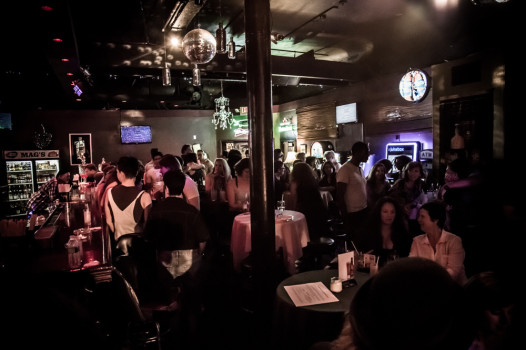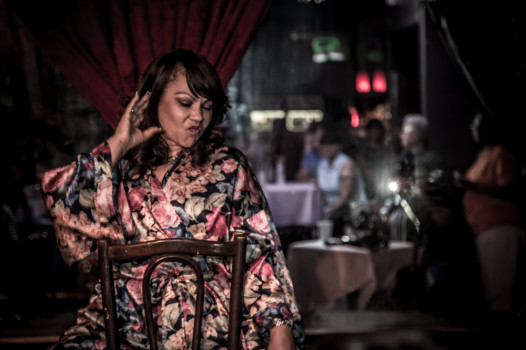June is Pride Month and around the world LGBTQ people are celebrating with our communities. During Pride it’s customary to lift up histories of queer liberation. Stonewall gets a lot of lip service, but retellings of this historic moment sometimes leave out the fact that the famous riot was instigated by gender non-conforming people of color, including Sylvia Rivera (a latina transwoman) and Stormé DeLarverie (a mixed race butch lesbian). Stormé is said to have thrown the first punch at Stonewall. She was born in New Orleans but her name is unknown by many, even within local queer communities.
New Orleans has its own distinctive queer history, although it often goes untold. There are gay tours of the French Quarter available, but they focus on famous figures, particularly white gay men, leaving out large swaths of our history.
As part of the New Orleans Dyke Bar Project, I’ve been working with my collaborators, Bonnie Gabel and Sara Pic, for the last year to record oral history interviews about one slice of New Orleans queer history – the lesbian bars that once provided a thriving gathering space for women to meet, share resources, and build collective power.

A crowd gathers for a drag show benefit for the Dyke Bar Project at Mags 940 on Elysian Fields, the former site of Charlene’s. Credit: Melisa Cardona
For generations, the primary spaces where it was safe for women to be out in public were these bars. “Most people met at bars,” Mardi Youngblood, a queer activist in her seventies, explained in an interview. “You could go out if you wanted to and feel accepted. You could feel part of a community.”
“It was like we would exist the rest of the week,” Donna Bechet-Kilbourne told me, “Friday and Saturday night you had a party to go to. That’s where you’d live. That’s what you’d live for.” Donna is a leader in New Orleans’ Black lesbian community and a founder of Living in Progress, the first krewe for women-loving women of color and their families.
Here’s an excerpt from our interview with Donna about the bars she frequented, including Les Pierres and Pinstripes and Lace.
These bars were also spaces where women could share much needed resources. Dianne Schneider was the bartender at her sister’s bar, Charlene’s. “If there was a problem and I knew someone that was a customer that could help this person professionally,” she told me, “we could get ‘em free help. And secret, families wouldn’t have to know.”
Dianne also remembers Charlene lobbying local politicians to support gay rights, inviting them into the bar to make stump speeches. She would hold Christmas toy drives in the bar and strategically donate the toys in the district of politicians who had earned her support. Her bar was a gathering place for women before marches and rallies in the French Quarter.
Lesbian bars were not strictly safe spaces. Through the late 1960’s and early 70’s bars were frequently raided by the police. Women were arrested and charged with “lewd conduct” on account of dancing with other women. Some were accused of prostitution. Dianne recalls being swept up in a raid on her 18th birthday when she went out with a group of friends, including her sister Charlene. As was customary at the time, images of the women who were arrested were printed in the paper. Charlene lost her job and was devastated.
Over the course of the last year we’ve been recording stories like these, both lighthearted and heart breaking. We plan to create an archive with the audio recordings so that current and future generations have an easier time accessing these stories. We are also creating an original performance that weaves together themes from the interviews and holding regular events to bring together women from different generations and communities.

Donna Bechet-Kilbourne, an interviewee for the project, performs in our drag show benefit. Credit: Melisa Cardona
Pride is not the only time to lift up and celebrate stories of queer spaces, survival strategies, and struggle. We plan to keep sharing stories year round, for years to come.
The New Orleans Dyke Bar Project has a work-in-progress showing in Sound Off!, a festival of new works, on Thursday, June 19th at 7:30 at the Shadowbox Theater (2400 St. Claude). That will be followed by a Creative Intensive in July (check their facebook page for info about participating). They’ll continue to share stories with us on NolaVie throughout the summer. If you’re interested in the project or know someone who might like to participate, email dykebarneworleans@gmail.com.
 NOLAbeings Multimedia artist Claire Bangser created NOLAbeings as a portrait-based story project that marries...
NOLAbeings Multimedia artist Claire Bangser created NOLAbeings as a portrait-based story project that marries...  Voodoo in New Orleans: Reviving history: New Orleans fortune telling This article takes a deep dive into the history of Voodoo in New Orleans, its hybridization with Catholicism, and its present-day place in the city's culture. The author visits fortune-tellers in the French Quarter, using their guidance as a tool for introspection rather than a deterministic predictor of the future. Through her experiences in New Orleans, the author feels a mystical connection to both the past and the future.
Voodoo in New Orleans: Reviving history: New Orleans fortune telling This article takes a deep dive into the history of Voodoo in New Orleans, its hybridization with Catholicism, and its present-day place in the city's culture. The author visits fortune-tellers in the French Quarter, using their guidance as a tool for introspection rather than a deterministic predictor of the future. Through her experiences in New Orleans, the author feels a mystical connection to both the past and the future. 